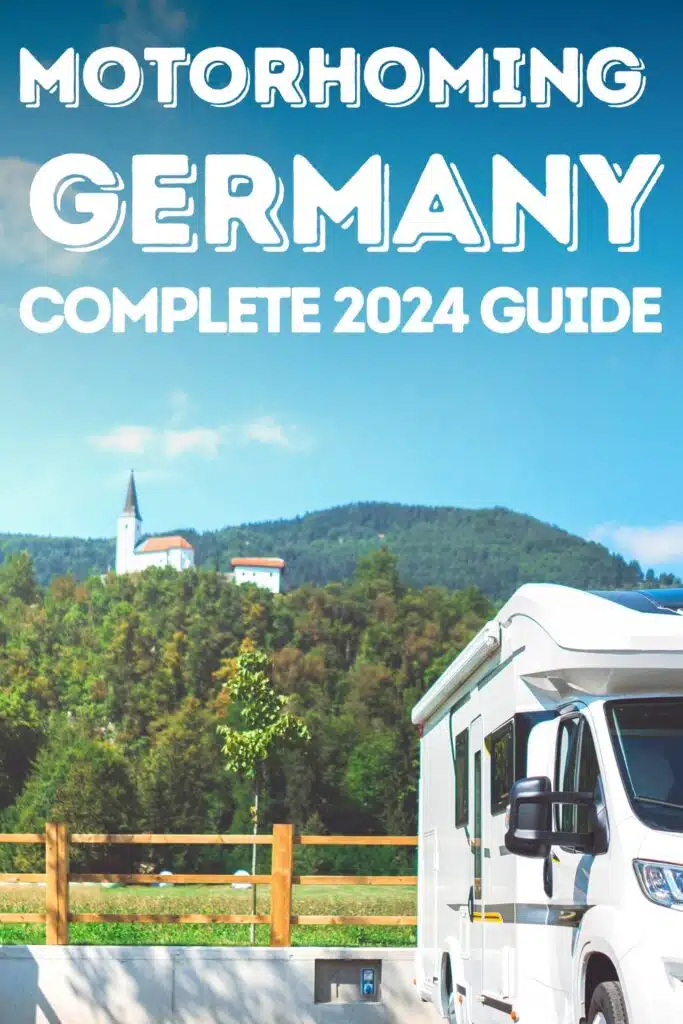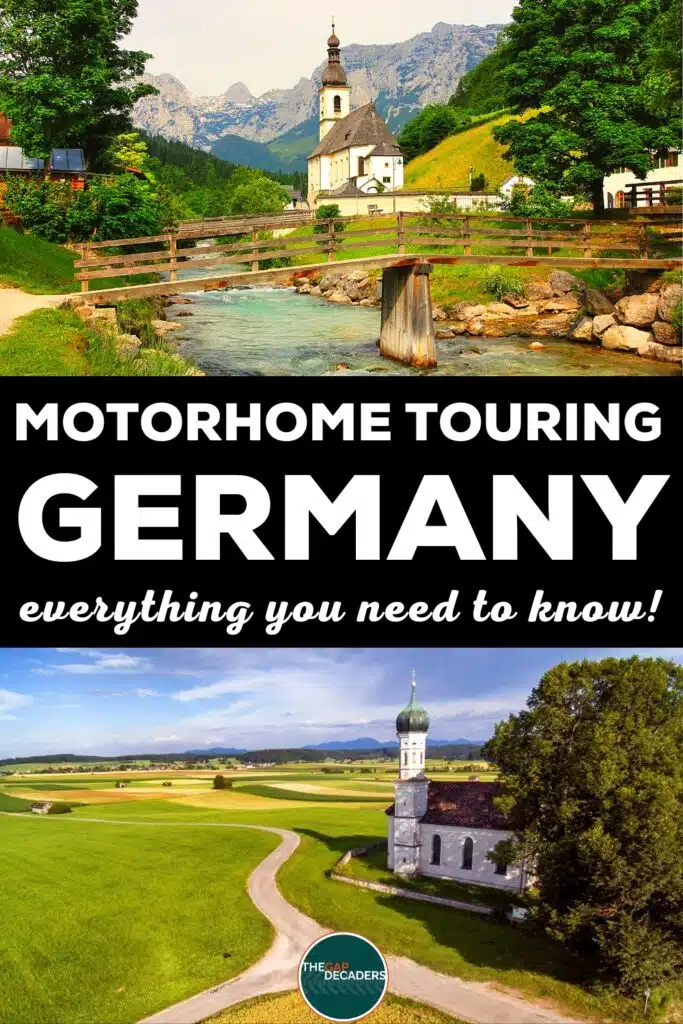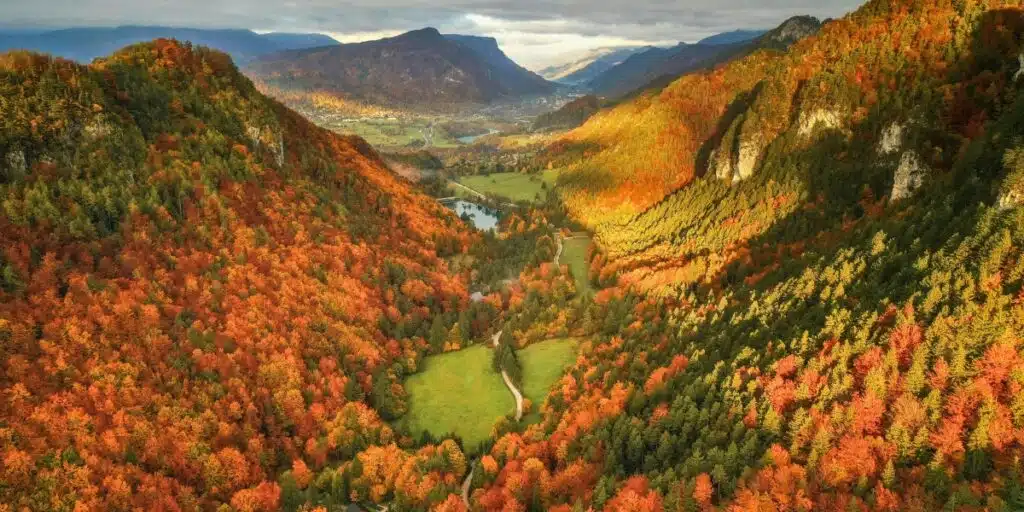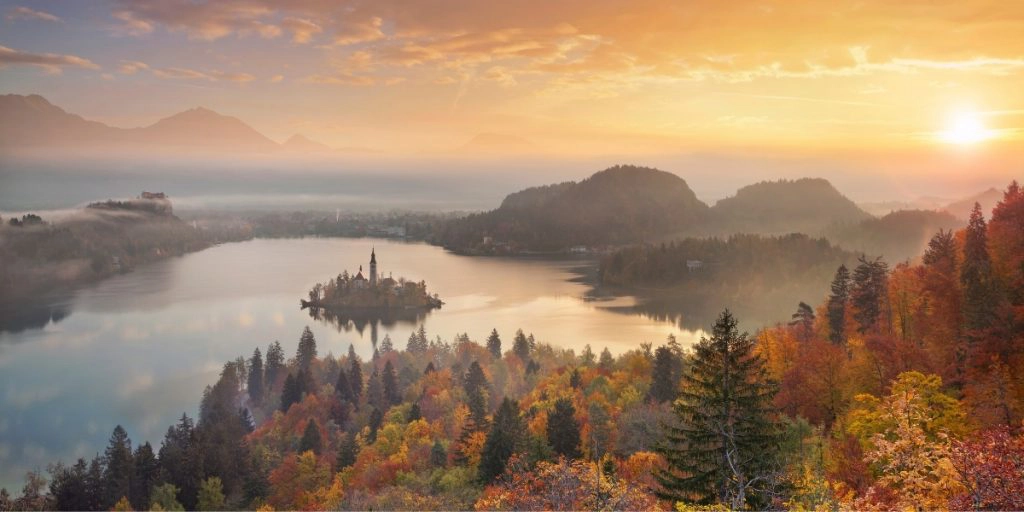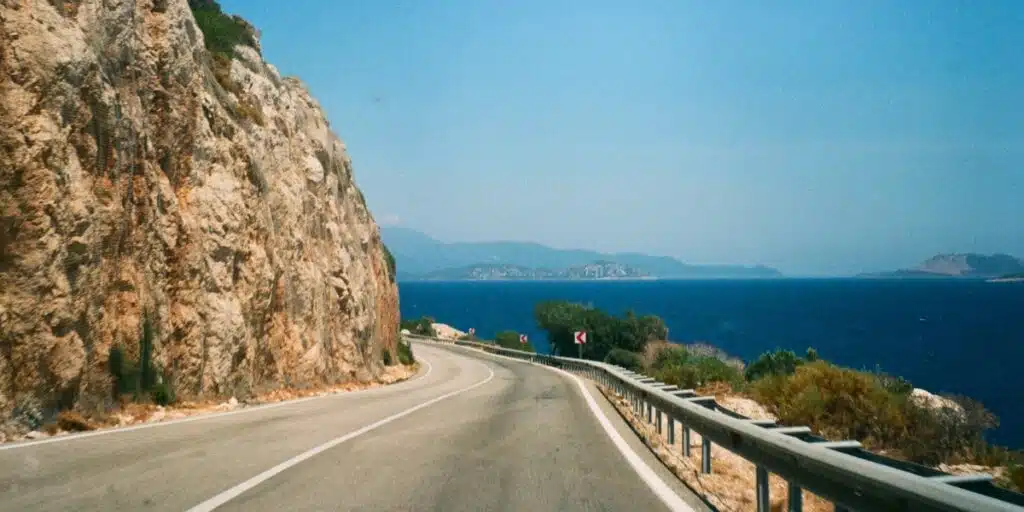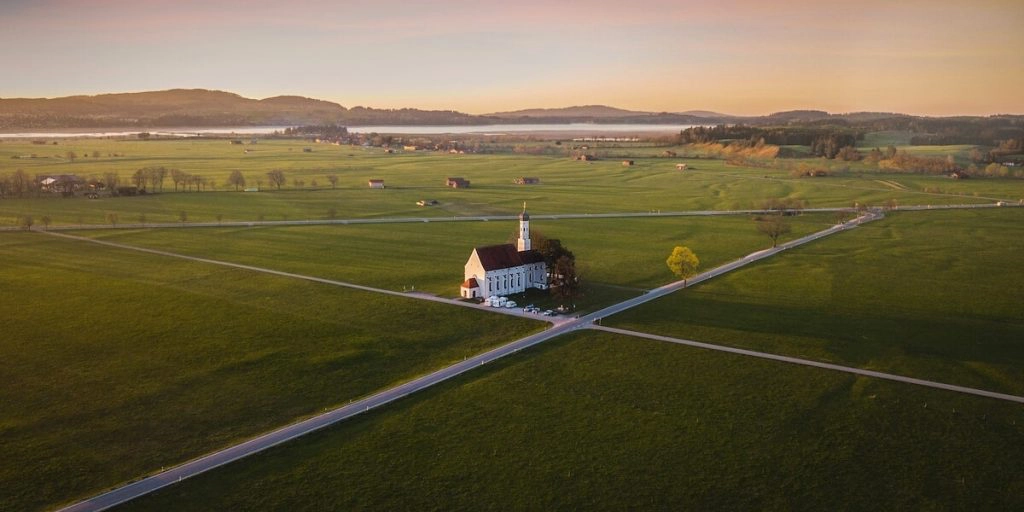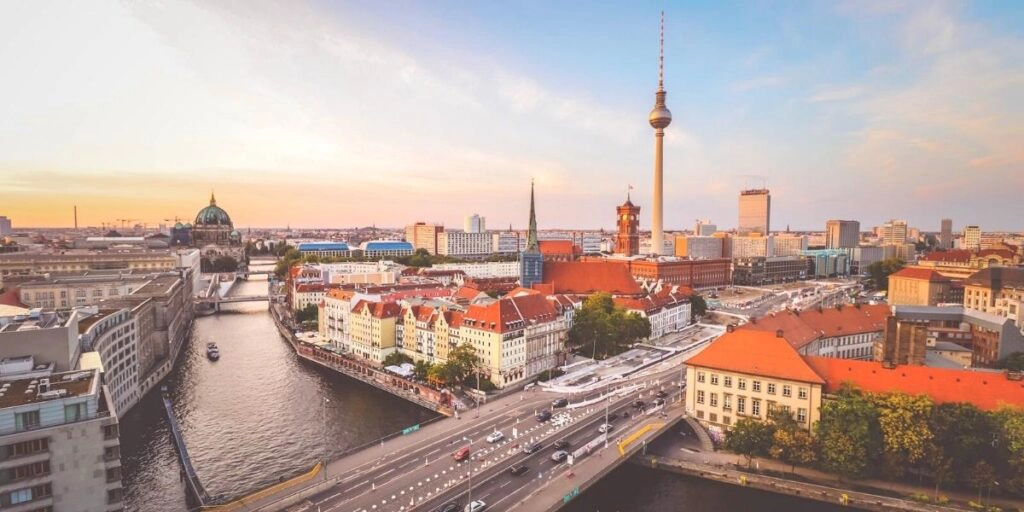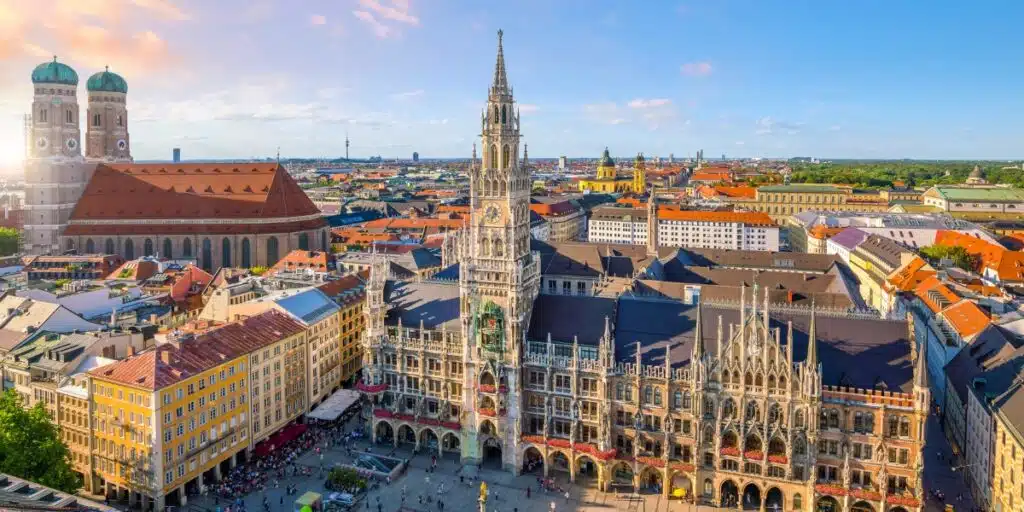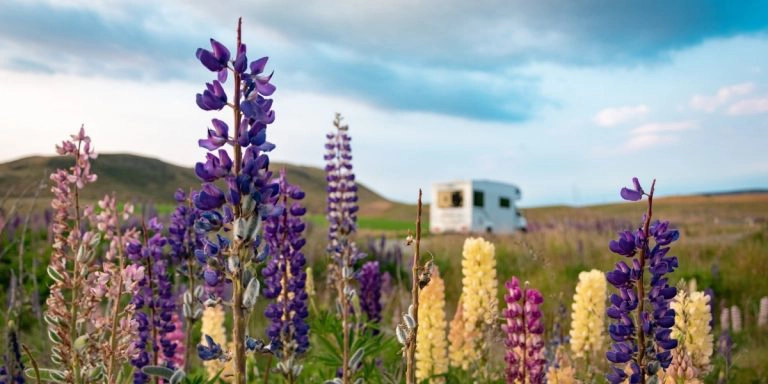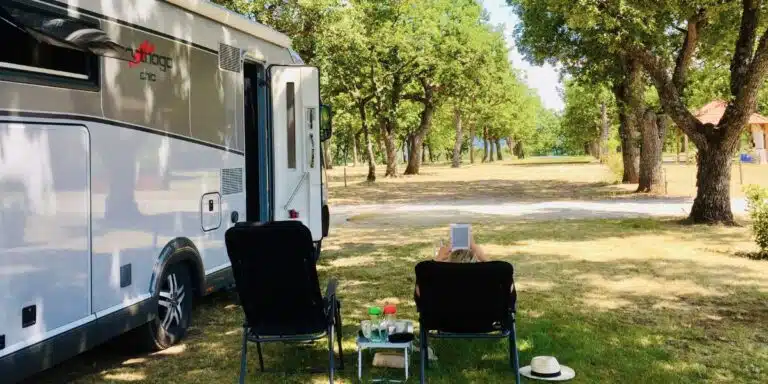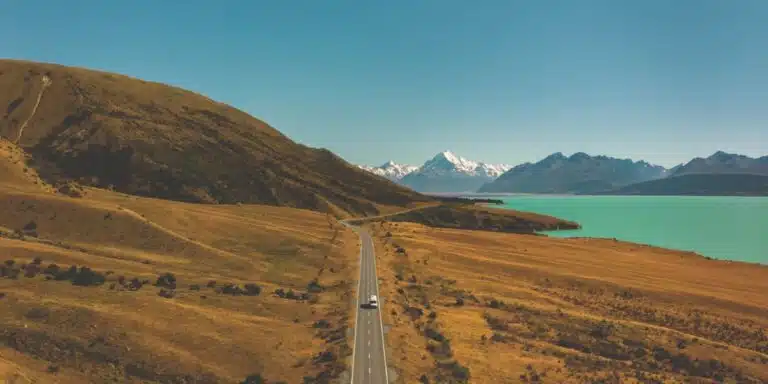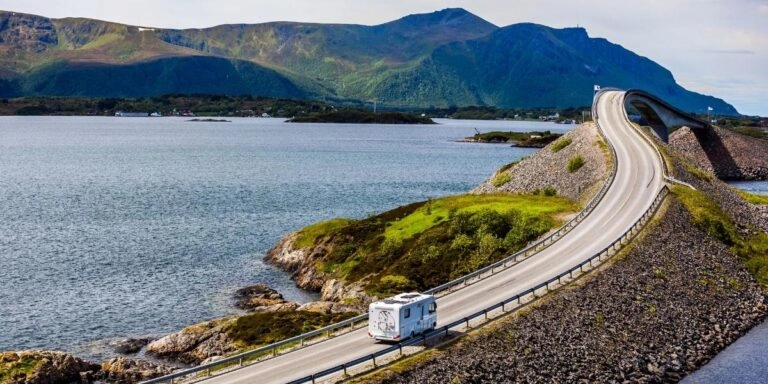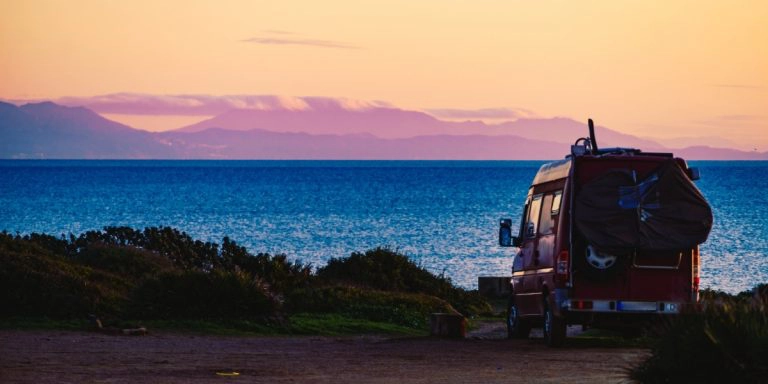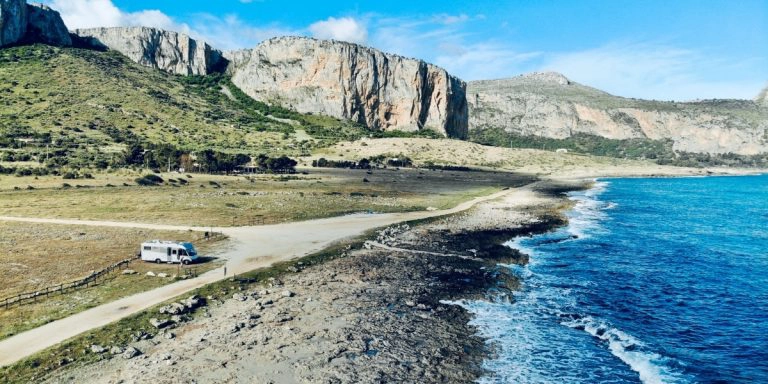This post may contain affiliate links, from which we earn an income. Click here to read our affiliate policy.
Motorhoming & Campervanning in Germany
A motorhome tour of Germany offers incredible adventures. From the stunning German Alps, and the Black Forest with its gorgeous romantic road, to medieval cities, fairytale castles and magical Christmas markets, this surprising and interesting country is a must-see road trip destination for campervans and motorhomes.
Germany’s ease of access, fantastic driving roads and unexpectedly beautiful landscapes and cities make the country perfect for motorhome travel. Bypass the central industrial belt and head for the Black Forest and Bavaria, or go north for the beautiful islands and tranquillity of Germany’s only coast.
We’ve spent months touring in Germany over the past five years of full-time motorhome life. Our advice and tips for motorhoming in Germany cover getting there, driving, where to stay overnight, off-grid and wild camping, motorhome and camper van services, and a round-up of the best motorhome destinations. In fact, you’ll find all the information you need for an amazing motorhome road trip in Germany.
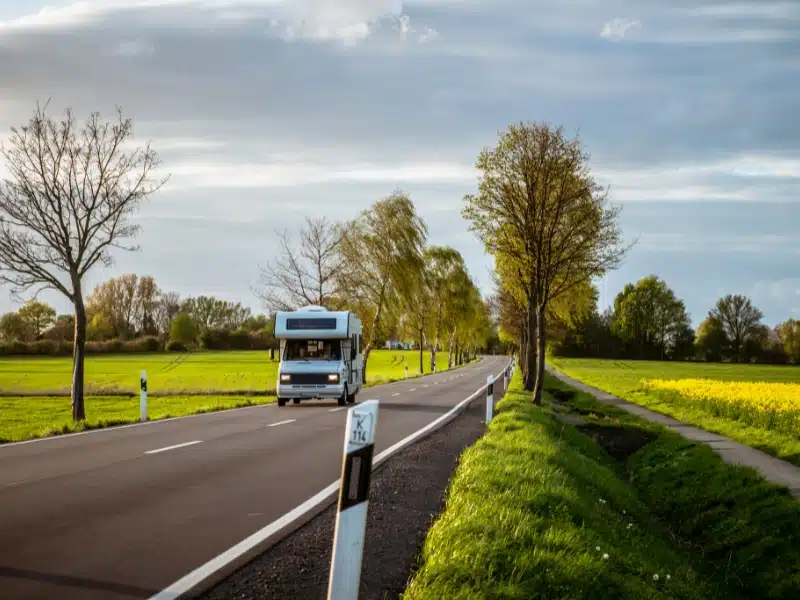
German Motorhome Routes
Crossing the Channel
There are a number of ways of taking your motorhome or camper to Germany from the United Kingdom.
Getting to Germany
Whether you’re planning a motorhome route through Europe with Germany as just one destination, or a longer tour, the country is a popular one with Brit motorhomers. Once you’re on the continent, there are a number of driving routes to Germany, depending on your destination:
From Calais
From Calais, the quickest routes are the E42 and E411 via Luxembourg, crossing the border near Trier and the E40 and E42 routes via Brussels. Both will take around five hours and are cost-effective from a toll point of view.
A longer, but more scenic (and more expensive) route, takes you through France on the A26 and A4 via Reims and Metz. From here you can pick up one of the many autobahn routes in Germany, or maybe take the slow road and enjoy the countryside.
From the Netherlands
From the Dutch ports, it’s an easy two hour motorhome journey to the German border west of Dusseldorf, although once into Germany, this route does mean negotiating the busy road network around the industrial and built-up cities of the Rhine, before you can continue your onward journey.
Campervan and Motorhome Rental in Germany
Flying and hiring a motorhome is the best way to tour Germany if you don’t own one. Our recommended German campervan hire company is Motorhome Republic, who have rental stations in Berlin, Cologne, Essen, Frankfurt, Munich, Leipzig, Hamburg, Hannover, Stuttgart and many other major German cities – perfect starting points to see all the best bits as you road trip Germany.
An aggregate motohome and campervan booking site, Motorhome Republic pull together all the best deals from a number of rental companies, to offer you a wide choice of options from large motorhomes to small campervans, alongside an excellent English speaking expert motorhome Concierge Team.
You can also hire a motorhome in the UK and drive it across to Germany and beyond. Most hire companies allow their motorhome rentals to be taken overseas, including our recommended motorhome rental company, Spaceship Rentals. With a depot in London, top-notch customer service and all the equipment you need in your camping vehicle for an easy holiday, Spaceship offers some of the best deals for Europe.
Motorhome Germany & Brexit
Although the UK left the EU at the beginning of 2020, because the pandemic came swiftly on its heels, many self-drive holidaymakers are still realising the repercussions and getting used to how it affects travelling in a motorhome.
You can find out all the details you need in our guide to motorhoming in Europe after Brexit. In the meantime, here are a few frequently asked questions and answers:
Do I need a visa for Europe?
Nothing changes with your passport, but from 2025, the EU will introduce the ETIAS (European Travel Information and Authorisation System), which will be an additional entry requirement for visa-exempt travellers and will involve the traveller registering their details online before travelling, mainly for security purposes.
How long can I stay in Europe?
UK citizens can only stay in the Schengen Area (a zone in Europe where countries have no internal borders and allow the free and unrestricted movement of people) for 90 days in every 180 days in the Schengen Area.
The 90 in 180 day rule works on a rolling basis and it can be difficult to work out whether you are within the rules or not, especially if you have visited the Schengen area on several occasions in the preceding 180 days. It’s a good idea to use a Schengen Calculator to work things out before your campervan trip and make sure you stay within the rules.
What food can I take in my motorhome to Germany?
The European Commission says the following;
Can I use my mobile data in Germany?
It very much depends on who your mobile phone contract is with and when you started the contract. All UK providers now limit data usage in the EU in some way or another, and it’s best to check with your provider to make sure you don’t run up a big bill. You can find lots of information in our guide to the best SIM cards in Europe, especially if you’re planning to be away for more than a few weeks.
We have been using and recommend ConnectPls for cloud SIM connectivity in the UK and Europe. You can choose from unlimited data packs to just single days, depending on your needs. The device is no larger than a slimline smartphone, connects with up to ten devices, is charged easily with a USB and can be delivered within a few days of ordering. Use the code ‘thegapdecaders’ at checkout to get 50% off in the first month!
Can I take a pet to Germany in my motorhome?
Yes, you can take dogs, cats and ferrets to Germany. You’ll need to book a pet-friendly cabin or kennels on the ferry or travel via the tunnel. Your pet will need a microchip, a valid rabies vaccination and an animal health certificate (AHC).
It can take some time to get all the documents together and the vaccines organised, so make sure you start the process well in advance. You can find out more about travelling with pets on the Gov.UK website.
More motorhoming in Germany travel advice and guides;
When to Visit Germany in a Motorhome
December to February
Germany can get very cold in winter, especially in the north and east, and of course in Bavaria. The more adventurous will be happy to visit the amazing Christmas markets and dustings of snow creating a fairy tale landscape.
The Germans are also good with the snow, and their roads and services continue as normal. You’ll need heating in your van and winter tyres to tour at this time of year.
March to May
Spring is a wonderful time to visit Germany, with temperatures warming up across the country. Markets increase in size, restaurants start preparing different dishes and the countryside is glorious. You’ll still find the roads and cities less crowded, and campsites will start to open in April.
June to August
Summer will give you the best weather, snow-free hiking, and long days – but the roads and sites will be much busier. June and July are the high season and busiest months and campsites may need to be booked in advance, but the temperatures are perfect for motorhoming and outdoor activities.
September to November
Autumn is a fantastic time to visit Germany, especially the wine-producing regions. If you’re lucky, you’ll enjoy an Indian summer amongst the grape harvest and changing colours of the fall countryside.
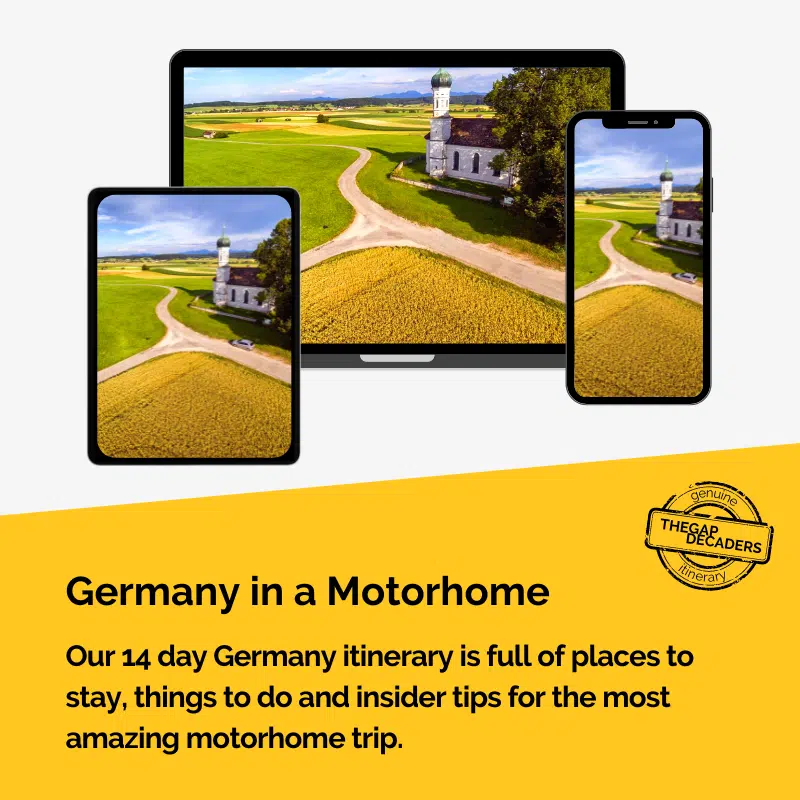
Germany Motorhome Itinerary
Let us do the planning for you and grab our German motorhome itinerary, packed with campsites, stellplatz, attractions and insider tips.
Get up every morning knowing your trip is planned with driving routes, overnight stops and attractions marked out for you on your interactive map.
Driving a Motorhome in Germany
German drivers are confident and assured and generally drive very well, although fast. The roads are well maintained and without speed limits on much of the autobahn network.
Germany is the home of Hymer and the VW Camper, amongst the first motorhomes. German campervans are popular and regularly seen, and you will often receive the obligatory wave from fellow van lifers, motorhomers and even caravan towers!
Is this your first time visiting Germany? Get all the information you need in our Germany Travel Guide, including what to pack, the best time of year to go, getting there and practical tips to help you have the best trip!
German Speed Limits for Motorhomes
Always observe the speed limits when campervanning in Europe. There are speed cameras just as in the UK, and the Spanish (and other EU) authorities have been known to pursue Brits for non-payment of fines. This has not changed since Brexit as the information-sharing agreement with the DVLA continues.
Motorhomes < 3,500 kg
Motorhomes > 3,500 kg
Documents You Need to Travel & Drive in Germany
Make sure you have travel insurance you can trust when motorhoming Germany. We recommend True Traveller for their 5-star TrustPilot reviews, variety of cover options, best activities cover as standard, great prices and excellent service.
Vehicle Safety Equipment for Germany
Rules of the Road for Motorhomes in Germany
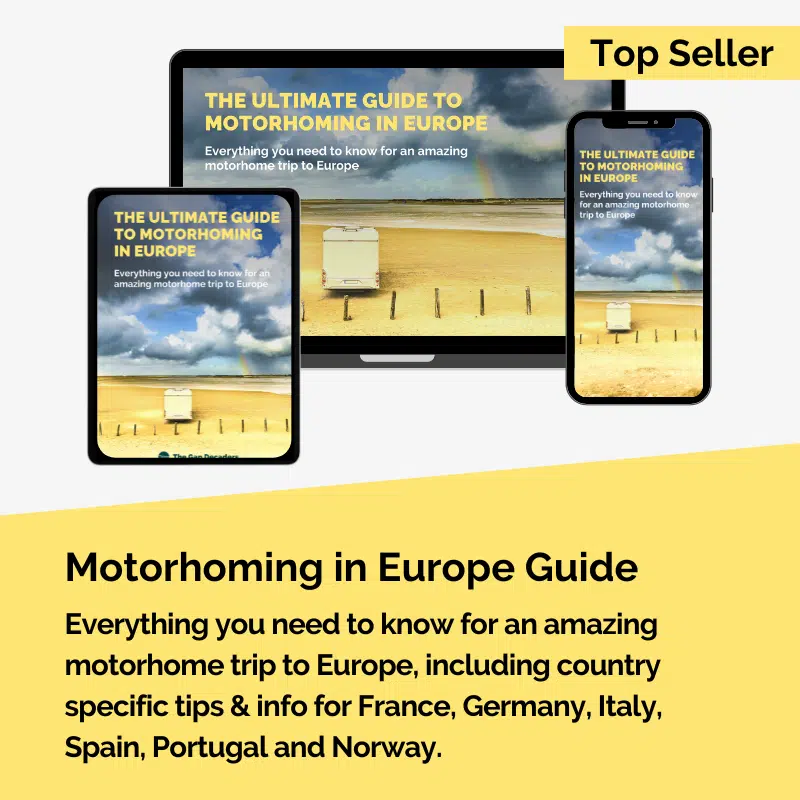
The Ultimate Guide to Motorhoming in Europe
If you’re planning a motorhome trip to Europe for the first time, our guide has tips, advice and info to help you plan your tour.
Don’t struggle trying to plan your European trip, find out everything you need to know before you go + loads of motorhoming tips for when you arrive.
German Motorway Tolls
There are no tolls to pay on the motorways here, making autobahn routes through Germany a really cost-effective way to access Italy, Switzerland, Austria, Liechtenstein, Czech Republic and Poland.
If you are travelling in a massive motorhome camper that is over 7,500kg, like an RV, overland truck or converted lorry, then we believe that you are exempt from the tolls placed on lorries over this weight.
The toll-collect.de website states the following;
Vehicles that do not fall under the legal definition of a vehicle subject to toll (according to § 1 Paragraph 1 Clause 2 of the German Federal Trunk Road Toll Act (BFStrMG)):
a) are neither structurally intended for road haulage (e.g. self-propelled working machines);
b) nor used for commercial road haulage or own-account transport operations for charged or business-related transportation of goods (in accordance with Section 1 of the German Road Haulage Act (GüKG)).
Toll exemption only results when both requirements are fulfilled. Otherwise, registration as a toll-exempt vehicle is not possible. Registering your vehicle as toll-exempt is not obligatory, although it may allow you to avoid unnecessary checks.
If you do cross Germany’s borders, remember that Switzerland, Austria, Czechia and Poland require a vignette to use their motorways, with big fines if you forget. You can usually stop at a service station just before or after the border to pick one up, or buy online from Asfinag in Austria, Vintrica in Switzerland, eDalnice in the Czech Republic, and in Poland you can use their e-Toll app for tracking and payment.
Motorhomes over 3,500kg in Austria and the Czech Republic require an onboard unit which can be collected and registered at service stations just after the country border.
RELATED POST: Tolls for Heavy Motorhomes >3.5T in Europe: Country by Country Guide
Low Emission Zones in Germany
There are currently 75 umweltzonen or low emission zones in more than 70 cities and built-up areas in Germany. In the Berlin Environmental Zone (the area within the S-Bahn ring) motorhomes are not allowed to enter, regardless of their conformity.
For other LEZ in Germany you will need an umweltplakette or environmental sticker which you place on the windscreen to show the level of your vehicle’s emissions. This determines whether you can drive into the LEZ areas in your campervan or motorhome.
To purchase these environmental stickers, you must be able to evidence that the vehicle meets the Euro 4 standards for a green sticker, by providing copies of the V5C for newer vehicles (manufactured after January 2006), or a Certificate of Conformity provided by the manufacturer.
A yellow sticker only allows you to enter the LEZ of Neu-Ulm in Bavaria and, from 2021 red stickered vehicles have not been permitted into any LEZ, which means most older diesel vehicles will be fined if they enter.
Head to the Umwelt-Plakette.de website for more information and to get your sticker – you will need to do this at least six weeks before departure to give it time to be processed and arrive in the post.
Motorhome Services in Germany
Motorhome services are generally widely available across the country. Some garages and supermarkets will have potable fresh water and a place for grey water, and in southern Germany there is often drinking water available by the side of the road – although you’ll need a water thief fitting like this to connect a hose pipe.
You’ll often see the typical pictogram sign by the side of the road pointing you to a service point, this may be a dedicated area, within an aire or a built-in box-type service like those you see in France.
Use an app like Park4Night to locate motorhome and campervan services.
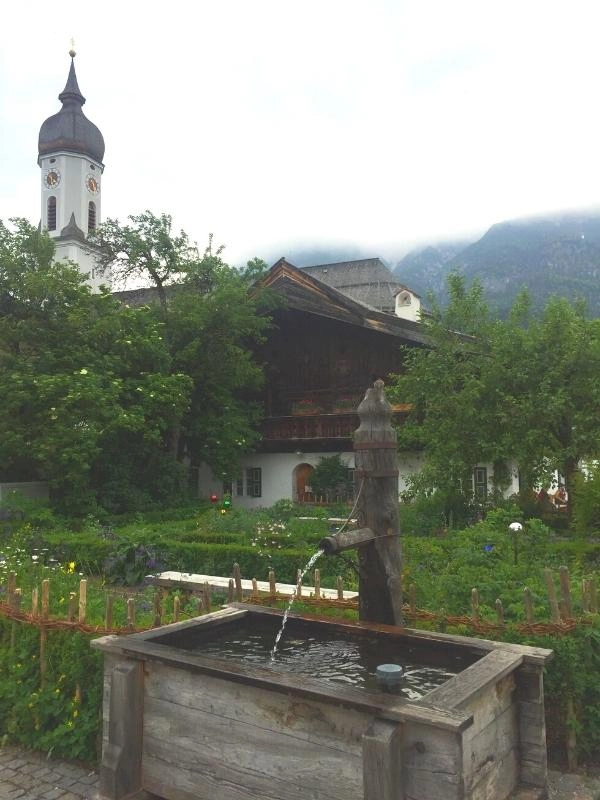
LPG & Bottled Gas
LPG (called GPL in most European countries) for refillable systems is available in many garages, use the myLPG app to search near where you are.
Gas bottles are also widely available, with propane generally being more popular because of the climate (propane is better than butane for cold climates as it burns at lower temperatures).
For German gas bottles, you will need a different regulator, available from most DIY or camping shops.
Fuel
Most garages will require you to pay electronically for fuel at the pump. Usually, you can adjust the instructions to English. Super 95 is Regular Unleaded, Super Plus 98 is Premium Unleaded and Diesel is Diesel.
Motorhoming in Germany FAQs
Can you park a motorhome anywhere in Germany?
You can park a motorhome or campervan on the street or in a car park for a maximum of 24 hours, provided there is no sign prohibiting this. You can also stay the night on private property if you have permission from the owner. Remember that ‘parking’ is different to ‘camping’ though, and if you’re percieved to be wild camping in where only parking is allowed, you may well be moved on.
Is Germany good for campervans?
Yes! Germany is the home of the campervan and where the lifestyle started when the first VW campervan was launched at the Geneva Motor Show in November 1949.
What do I need to drive a motorhome in Germany?
You must have a valid driving license in your home country and your motorhome must be legal in the country of registration. If you’re motorhoming in Germany from UK, this means your van must be insured (minimum 3rd party), taxed and have a valid MOT.
What is the best motorhome route through Germany?
That depends on what you want to see and do. Germany is known for its themed driving routes and has over 80, covering wine, food, castles, half-timbered houses and even fairy tales! Our German motorhome itinerary covers a bit of all the best bits, including the Black Forest and Bavaria.
Is Germany motorhome friendly?
Yes, very. The German’s are a welcoming nation and love van life – just look at all the fantastic 3000+ stellplatz, many of which are provided by local municipalities at no cost.
Motorhome Stopovers in Germany
Stellplatz & Aires Germany
Motorhome aires in Germany are called stellplatz. Not all stellplatz offer a service point, their primary objective is to provide somewhere to sleep.
Some are free, but where they are not, they’ll always cost much less than a campsite. It’s normal to pay for additional services, such as showers and electricity, if they are provided. If you use a stellplatz there will usually be a set of rules displayed.
If there are no rules displayed, follow the usual courtesies regarding noise, waste, washing and so on. Many stellplatz will only allow you to stay for a minimum period. If this is not displayed, then you should stay no longer than 2-3 nights.
There are over 3,600 stellplatz so the chances are there will be one for every place to visit in Germany and they’re common on the outskirts of cities, making visiting easy.
Use the Reise Mobil Bord Atlas, stellplatz.info, All the Aires Germany, Park4Night or Campercontact Germany to find stellplatz stops by region and map.
RELATED POST: 29 of the Best Motorhome Apps – Free & Downloadable Now!
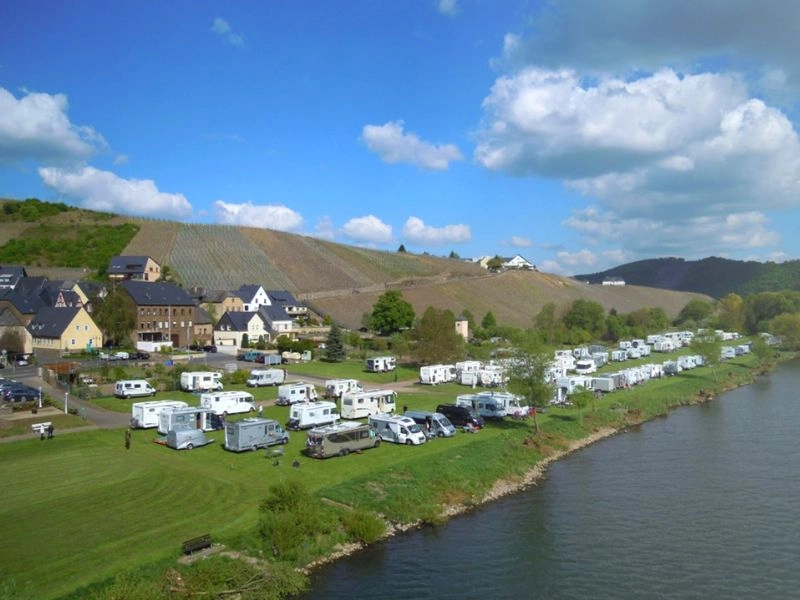
Rastätte
A Rastätte (rest stop) is a motorway services or parking area on the autobahn or main road. In addition to parking, there is usually a restaurant, toilet facilities (often chargeable) and a fuel station, and parking is free of charge.
There might be basic security like a floodlight and CCTV, but these car parks are not fenced or guarded in any way. You are also likely to find a lot of trucks stopping in rastättes, often moving on during the night, which can be noisy.
We would not recommend staying at a rastätte unless you really have no choice – they are noisy and we don’t consider sleeping in them a safe option.
Autohof
A good alternative to rastättes is Autohof, a network of privately run service stations. Autohöfe are not directly accessible from the autobahn but are often close to an exit and are usually signposted from the autobahn. You can also find autohöfe on most major highways.
Autohöfe are open 24 hours a day and allows overnight stays for trucks and motorhomes, and a growing number also offer service areas, sanitary stations for campers and even electric hookup and picnic tables. Their parking areas are fenced and guarded with CCTV.
Autohöfe does charge a fee for motorhome parking, but this is sometimes refunded when buying something in their shops, restaurants or petrol stations.
Use Autohof Guide or Park4Night to find autohöfe near you.
Wild Camping in Germany for Motorhomes
Overnight parking in Germany in a motorhome is permitted. This means you must not place anything outside your vehicle, or you will be ‘camping’ and this is illegal.
Use Park4Night or other free motorhome apps to find free motorhome camping in Germany and always follow our tips and guidance about wild camping in general.
RELATED POST: Motorhome Wild Camping – Your Complete Guide
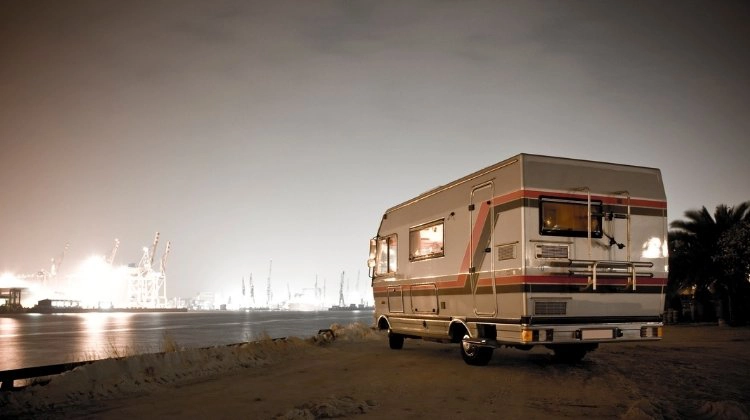
Motorhome Campsites in Germany
If you are looking to stay on a site, book with EuroCampings which has over 1,100 motorhome sites in Germany.
Usually, the standard of motorhome camping in Germany is very high, with modern and clean sanitary facilities and well-managed restaurants and site shops, although this is also reflected in the cost.
With CampingCard ACSI you can save up to 60% on the cost of a German campsite out of peak season, making the card really great value for money.
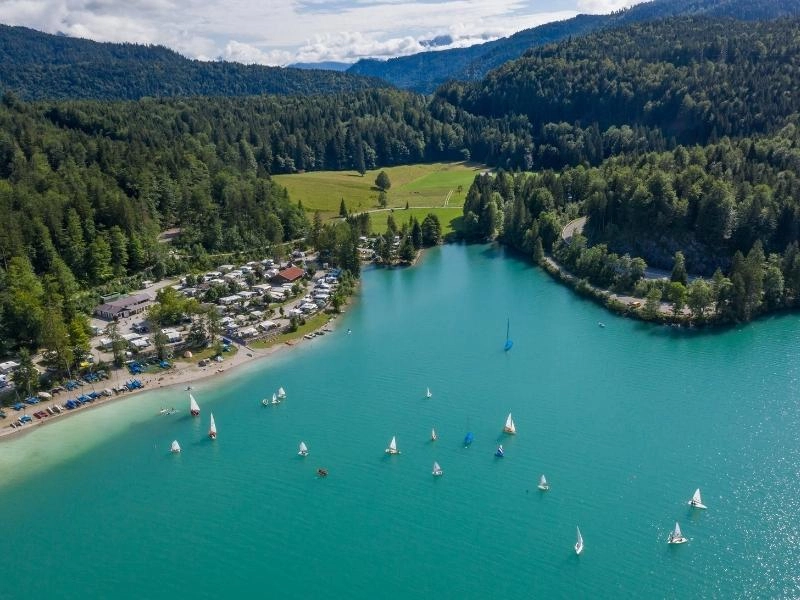
Landvergnügen
Similar to the France Passion scheme, Landvergnügen helps you get off the beaten path into rural Germany and discover over 1,100 idyllic places in nature where you can stay in a campervan or motorhome on a farm.
You must buy the book and vignette to be able to use the scheme and handy app.

Winzeratlas
Another such scheme is Winzeratlas or Wine Growers Atlas.
Billed as a connoisseurs scheme, Winzeratlas covers over 200 winemakers and taverns in the wine-growing regions of Germany, Austria and Alsace.
You’ll also find lots of information about wine, grape varieties by region and things to see and do near each stopover.
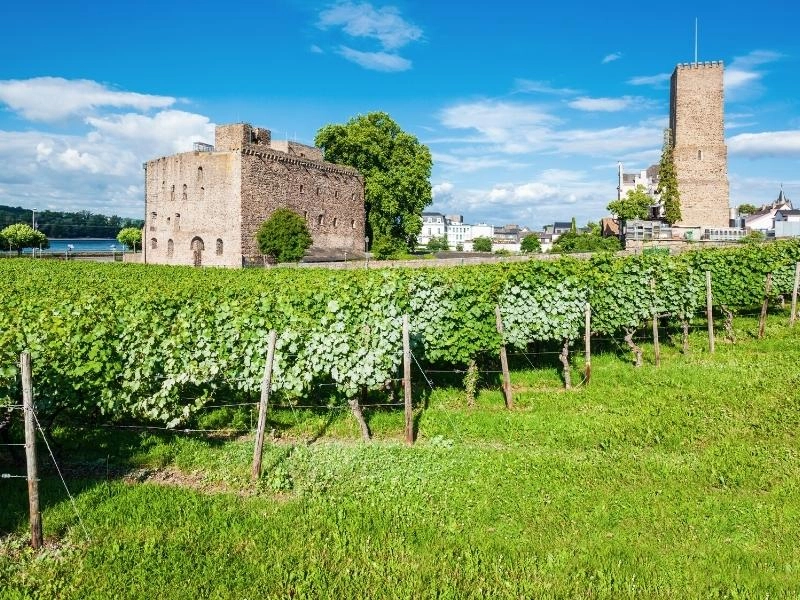
Germany Travel Books
German Motorhome Routes & Destinations
From Calais, you can be across the German border in around five to six hours. These are some of our favourite regions to explore when we’re travelling in our motorhome in Germany.
Baden-Wurttemberg
Baden-Wurttemberg is home to the most spectacular of Germany’s national parks, the Black Forest. But Baden-Wurttemberg actually has so much more to offer. It is also home to the charming historic university town of Heidelberg, the famous spa town of Baden-Baden and the Black Forest Ridgeway – a must-do road in a motorhome!
Located in the southwest of Germany, the region is packed with beautiful nature, as the Black Forest region gives way to the lovely Lake Constance (the Bodensee) and the lush Swabian Mountains, making the region the best option for a family holiday or outdoor activities, with watersports on the many lakes, hiking, and mountain biking.
There are also lots of quaint Black Forest villages, which are full of cuckoo clocks and their makers, settings of Grimm’s fairytales and of course, the famous Black Forest Gateau and Kirsch Schnapps, or sour cherry brandy.
Other cities of note are Stuttgart, Freiburg, and Konstanz, and tucked away amongst the most picturesque landscapes are lots of impressive and atmospheric castles just waiting to be explored.
If you’re travelling with kids, the state is also home to one of Germany’s largest theme parks, Europa-Park. Located in Rust, the theme park covers a vast 95 hectares and boasts over one hundred rides including thirteen roller coasters! There’s even a campsite, making it a great place to spend a few days on a family holiday.
RELATED POST: The Best of the Black Forest: Highlights & Hidden Gems
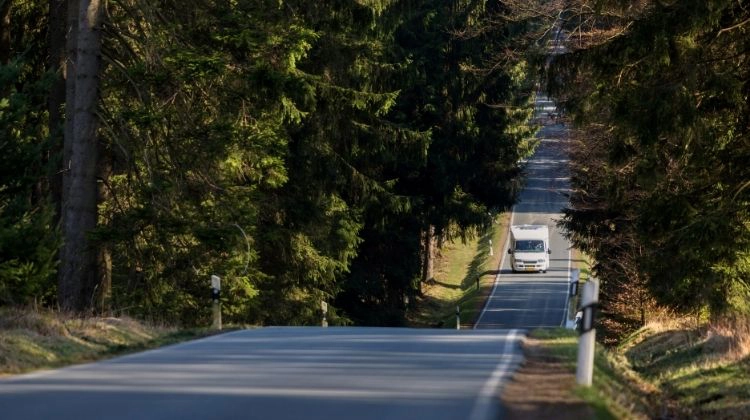
Bavaria
A motorhome tour of Bavaria is a firm favourite with many German road trippers. Bavaria is a wealthy region and home to stunning city architecture, interesting historical monuments, towering mountains, and of course, the world-famous Oktoberfest in Munich.
The region boasts a rich folk culture and for many, the stereotypical image of Germany comes from Bavaria’s unique traditions and cultural heritage – think lederhosen and beer steins!
The largest region in Germany, Bavaria is set in the south and is home to charming cities such as Augsburg, Bamberg, and Regensburg, the Zugspitze, known as the ‘top of Germany’, and the delightful Chiemsee, which offers fantastic swimming and sailing.
Bavaria is also the starting point of three themed driving routes which offer some of the best campervanning in Germany:
The gorgeous Romantic Road or Romantiche Strasse is one of the best motorhome routes in Germany, and stops off at imposing castles and medieval villages as you go, as well as the fairytale Neuschwanstein Castle, the daddy of them all!
The infamous German Alpine Road or Deutsche Alpenstrasse also starts its 550km drive from Lake Constance (Bodensee) at Lindau, climbing to Schönau on Lake Königssee and following the mighty Bavarian Alps from west to east. The route is peppered with fairy tale castles, medieval villages and monasteries, and of course, the most stupendous views.
Finally, the German Castle Road or Burgenstraße is a route in southern Germany through Bavaria, Baden-Württemberg and a small portion in the Czech Republic, between Mannheim and Prague.
Established in 1954 the route takes in the Neckar valley, the Hohenlohe Plateau, the Franconian Heights, Franconian Switzerland, the Fichtel Mountains and the Slavkov Forest and visits over 60 incredible castles and palaces.
RELATED POST: One Day Munich Itinerary + Map, Tips & Guide
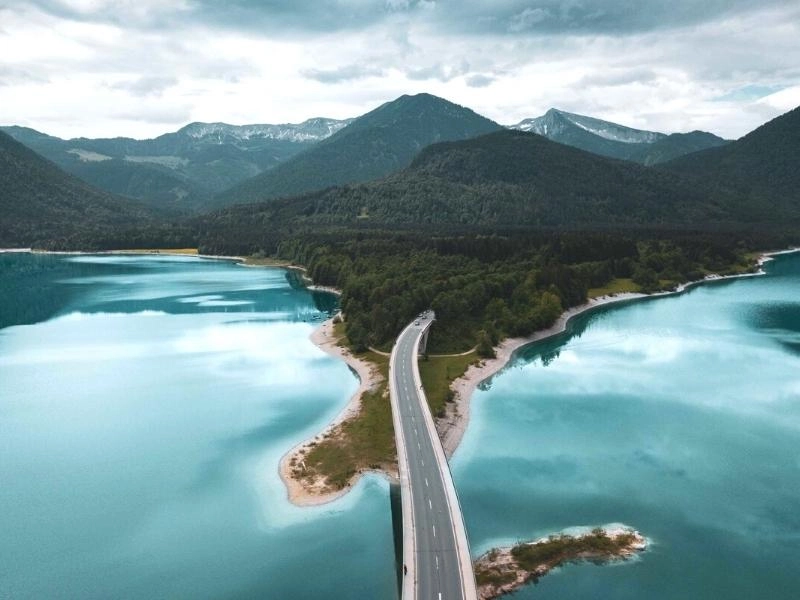
Brandenburg
Surrounding Germany’s capital Berlin and bordering Poland to the east of the country, the Brandenburg region is the historic heart of Prussia.
Full of beautiful forests, lakes, and rambling countryside, Brandenburg is delightfully underpopulated in comparison with other parts of Germany, and a great place for motorhome touring. Nestled amongst the picturesque landscape you’ll find pretty villages and towns waiting to be discovered.
A two hour drive to the south of the capital city is Spreewald, a biosphere nature reserve with forested areas, cycle paths and wetlands which are crossed by canals fed by the Spree River. Potsdam, with its magnificent palaces and parks, is also a must-see and the whole region is dotted with castles and palaces to visit on your motorhome holiday.
RELATED POST: Berlin in One Day – Itinerary, Map, Tips & Guide
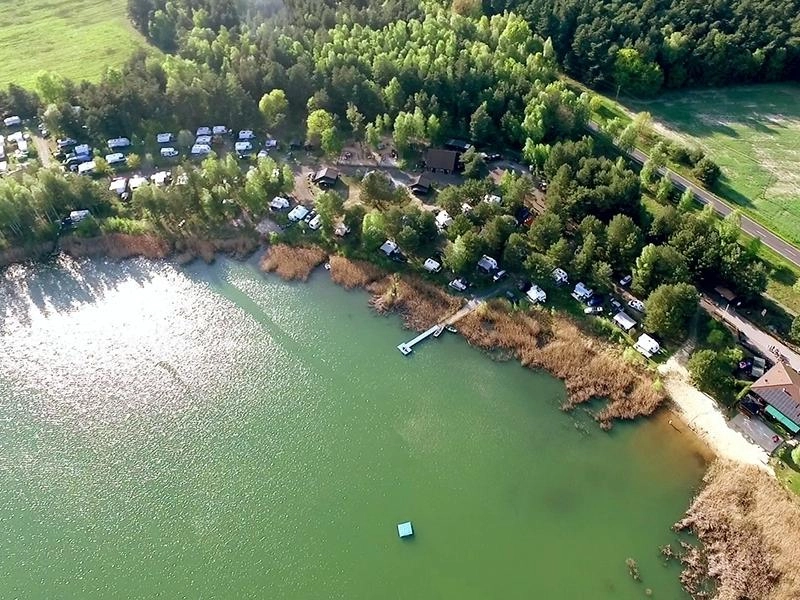
Hesse
Located in the centre of Germany, Hesse is one of the best places to enjoy stunning nature, with 40% of the region covered in forest, and the River Main and River Rhine running through it. There are lots of great outdoor activities to choose from, with hiking, mountain biking, and boat trips on offer.
The Rhine-Main area in the southwest of Hesse is peppered with charming towns and villages, with the Rheinsteig and Bergstasse routes particularly worth exploring, as they take you through some breathtaking countryside and lovely vineyards, home to many WinzerAtlas stopovers.
The region is also the starting point of the Deutsche Märchenstraße or Fairy Tale Route, which follows the footsteps of the Brothers Grimm and their famous fairy tales through medieval towns and villages to Bremen in Lower Saxony.
RELATED POST: Deutsche Märchenstraße: Germany’s Fairy Tale Road
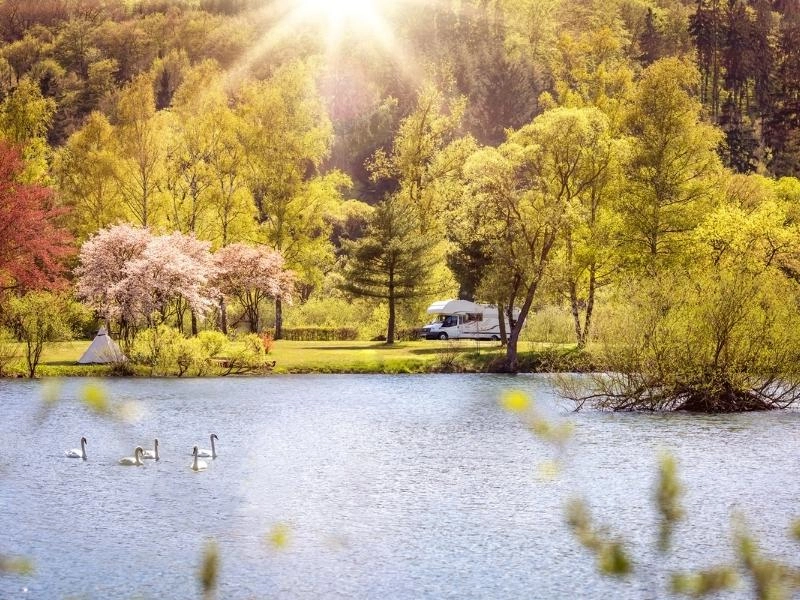
Lower Saxony
The most northwestern region in Germany and a natural addition to any motorhome tour of the Netherlands and Belgium, Lower Saxony is home to diverse landscapes including plains, meadows and farmland, and the rivers Elbe and Weser. The North Sea coastline and the scenic East Frisian Islands make it one of the country’s most popular holiday destinations.
Among all the natural scenery, the region is also home to some interesting cities and towns, such as Hanover, Celle, and Luneburg. Two of its main population centres – Bremen and Hamburg – are now considered regions in their own right.
Lower Saxony really does have a wide range of interesting places to visit and things to do. You can go hiking through the beautiful hills of the Elm Lappwald, swimming in the Wadden Sea and visit the medieval towns of Hildesheim and Gottingen.
RELATED POST: 24 Hours in Hamburg – Itinerary, Map & Travel Tips
Can’t decide? Our German travel guides might help…
Mecklenburg-Vorpommern
Mecklenburg-Western Pomerania (as the region is known in English) consists of the most northeasterly part of Germany, which is home to the wild and hauntingly beautiful Baltic Sea coastline.
As it is the least populated region in the country, there is lots of unspoilt nature, with lovely islands, lakes, forests, rugged cliffs, and picturesque beaches dotting the coastline – it makes a perfect motorhome destination if you like to be off the beaten path.
The main draws are the beautiful beaches and seaside towns, such as Rostock, Stralsund and Wismar – but there is a lot of history to be found here too. Visiting the castle at Schwerin is a must-do, as is taking a trip to Rugen, Germany’s largest island – you’ll have to leave the van behind though!
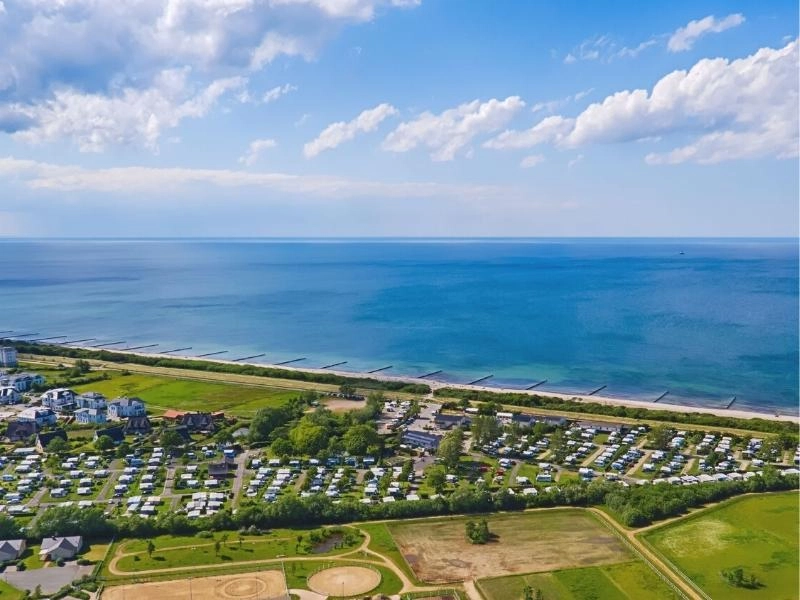
North Rhine-Westphalia
North Rhine-Westphalia is the most populated region in Germany with over 17 million inhabitants. The western state is home to some of Germany’s largest and most visited cities, such as Dortmund, Dusseldorf and Koln, and makes up Germany’s busy industrial belt.
While most people come for its wealth of historical and cultural city sights, the region also boasts the wonderful Teutoburg Forest, the mighty Rhine River and the Eifel Mountains, as well as lots of pretty waterways and Germany’s longest cycle highway, the Rheinradweg, it is possible to escape the traffic and people here if you get off the beaten track a little.
RELATED POST: Six Unmissable Germany Road Trip Routes
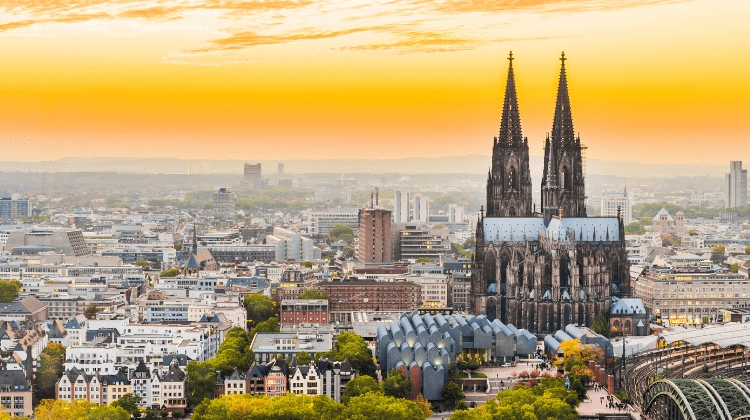
Rhineland-Palatinate
In the west of the country bordering Belgium and Luxembourg is Rhineland-Palatinate. The region is carpeted with rolling hills, sweeping valleys and vineyards, and the Rhine and Mosel rivers snake through the gentle landscape. This region makes a great motorhome trip from the UK if you only have a week or 10 days to spare.
The countryside is very picturesque and amongst the stunning scenery are elegant castles and historic towns such as Mainz and Koblenz. The Palatinate Forest alone is home to over 50 castles and crumbling ruins.
As the region is best known for its wines, taking a trip along the German Wine Route in your motorhome is a must. As well as sampling delicious local wines and admiring the natural beauty of the region, you can also go hiking and cycling through the scenic countryside.
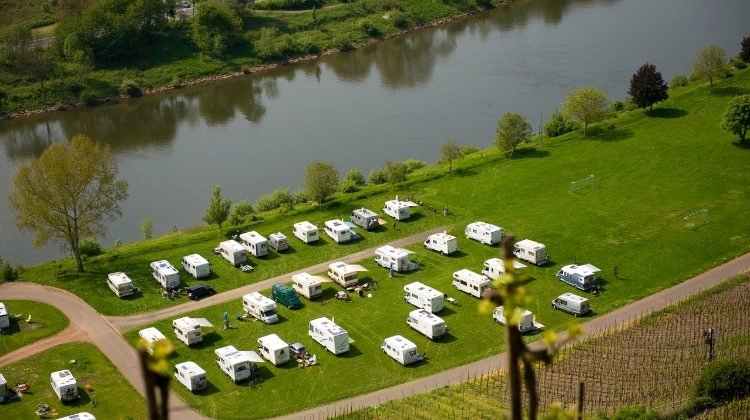
Saxony
Lying in the east of the country bordering both Poland and Czechia, Saxony is home to Leipzig and Dresden, two of eastern Germany’s most important cities. The latter is home to the oldest Christmas market in the world! The Dresdner Striezelmarkt dates all the way back to 1434.
Away from these two must-visit cities, Saxony is blessed with breathtaking scenery. Picturesque valleys and hills give way to crystal clear lakes and waterways, while in the southeast, the Ore Mountains dominate the skyline.
In addition to its beautiful nature, there are many castles, monasteries and historic towns for you to explore.
RELATED POST: Beautiful Cities in Germany: 27 Picturesque Cities to Visit
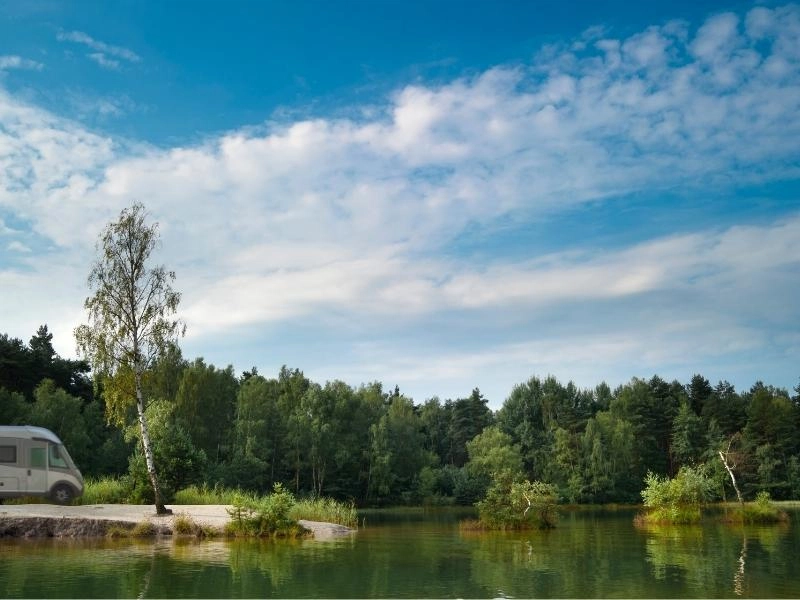
Saxony-Anhalt
Packed with historical and cultural sights and fascinating medieval towns and cities because of its central location in the heart of the former German Empire, Saxony-Anhalt is a wonderful region for a motorhome road trip.
While the three major cities of Magdeburg, Dessau, and Halle are worth visiting for their museums, monuments, and historical sights, further afield you’ll come across some hidden gems such as Merseburg and Naumburg.
Although the fascinating medieval towns and cities will dominate your trip, there is lots of nature to get lost in. The Elbe-Radweg is one of the most popular cycling routes in Europe, while Brocken Mountain and Bode Canyon are an outdoor lover’s paradise.
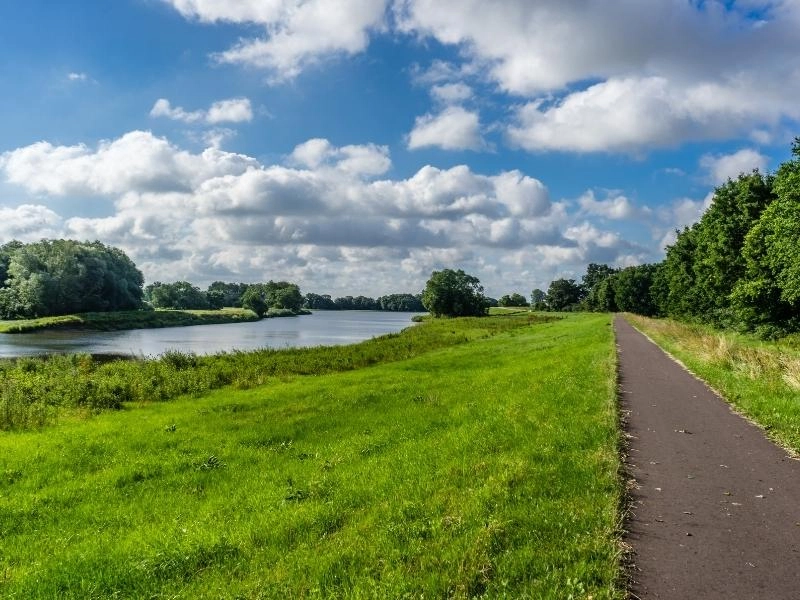
Schleswig-Holstein
Schleswig-Holstein in northern Germany borders brooding Denmark. One side of its gorgeous coastline is home to the North Sea, while the other lies next to the Baltic Sea.
Due to its proximity to Scandinavia, the region and its many cities and towns have their own distinct look and feel, with Kiel and the Hanseatic city of Lubeck being good examples of this hybrid Nordic-German atmosphere.
With many beautiful beaches, the region is a popular holiday destination amongst Germans, with the seaside towns of Gromitz and Sankt Peter-Ording seeing huge numbers of visitors every summer.
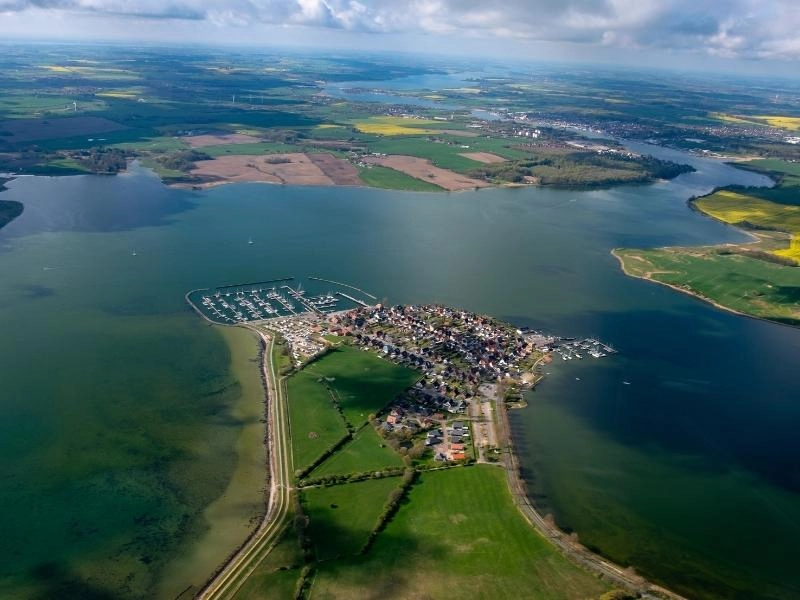
Thuringia
Slap-bang in the centre of Germany, Thuringia is often overlooked by holidaymakers. For those in the know, the wonderful forests, mountains, and historic cities pull them back year after year.
The four most important places to visit are Erfurt, Eisenach, Gera, and Gotha. Each of these richly historic cities has its own fascinating story, monuments, and museums for you to delve into.
Tucked away amongst its vast forests are some really picturesque towns, such as Weimar and Rudolstadt, which is home to the largest folk festival in the country. Offering the perfect combination of history, culture, and nature, Thuringia is an off-the-beaten-path destination that will introduce you to the authentic side of Germany when you visit in your motorhome.
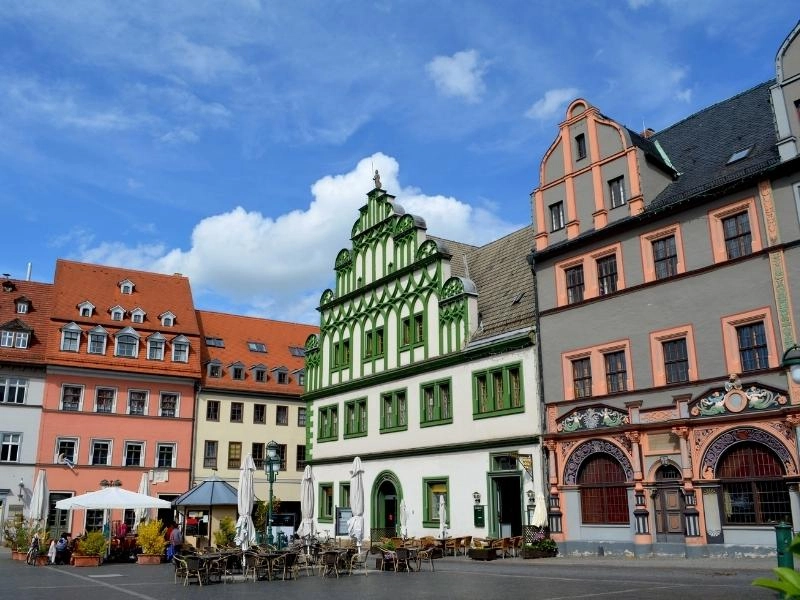
German Life
Culture
Germans place a high priority on structure, privacy and punctuality. The German people embrace the values of thriftiness and hard work. Life in Germany is well organised and Germans are usually very compliant with the rules. Although this may sound constraining, it means that everything works as it should; life is peaceful, the environment clean and you know what to expect when to expect it and how to deal with it!
- If you stay in a small rural town or village, you may come across strange rules; no hanging your washing out or vacuuming on Sundays, and no loud music between noon and 3pm on any day, for example. If you are motorhome wild camping rurally, make sure you know the local rules. German people are not known for holding back when you have done something ‘wrong’!
- In Germany, it is considered rude to stand too close to another person; one to two metres would be a good distance. This unwritten rule applies to people you know and also strangers, for example when you are queuing in a shop. Do not gesticulate too much when talking, this invades personal space even more!
- Public transport in Germany will be on time, every time. Do not allow yourself to run late or you will miss your bus or train. Oh, and once you’re on public transport, any conversation louder than a whisper will earn you stern looks, tutting and shaking of the head!
- German people rarely admit fault, even jokingly, and don’t usually hand out compliments. This attitude may seem unfriendly, but there is a keen sense of community and social conscience in Germany; self-containment is just part of their culture. Take the time to make contact and chat with locals and you will be rewarded with friendly, kind and helpful interactions.
- Jaywalking (crossing the road where there is no crossing or where the lights are not green) is illegal in Germany and whilst unlikely, you may get fined if caught.
- Shops and many bars and restaurants do not open on Sundays, even in tourist destinations. If you need a pint of milk or a loaf of bread on Sundays, the only places where you will find a grocery shop open are train stations, airports and petrol station forecourts.
- Despite Germany being a first-world developed country and at the forefront of the banking world, cash is king here. Lots of smaller places still don’t accept credit cards, especially if you are travelling rurally in Germany in your motorhome. Visit the cashpoint regularly.
- If you go to any type of beer festival, you will be charged a pfand (from pfennig, the equivalent of a cent prior to the euro currency). This is the deposit for the glass, which will not be returned until you give the glass back; if you are at a typical beer festival goes this will mean a huge collection of glasses!
- Germany is very open about their war history and younger people especially, are happy to discuss how it has affected their recent history. However, using the Nazi salute, shouting “Heil Hitler” and displaying the swastika or other symbols of the Third Reich is a criminal offence, punishable by up to five years in prison.
- Do not be disrespectful at concentration camps or Jewish memorials by taking selfies or climbing on memorial stones or buildings. Such places should be visited if possible; they do not always make for the most comfortable of tourist attractions but nevertheless, the holocaust and its victims should not be forgotten.
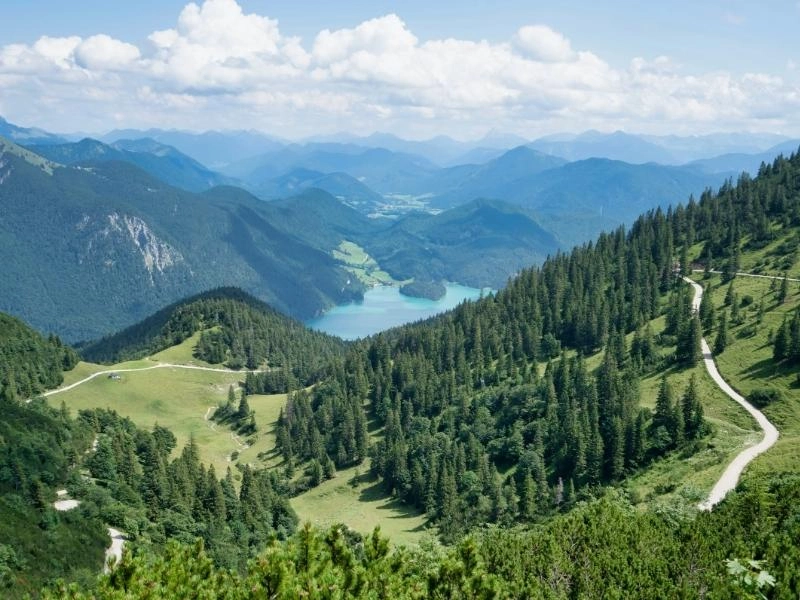
Food & Eating Out in Germany
Germany is a great country for rich and hearty food. Pork is the most commonly eaten meat and any type of wurste (sausage), of which there are over 1500, is extremely popular. Beer is the most popular alcoholic beverage, with brandy and schnapps following closely.
- Beer is taken very seriously. Germany is known as the birthplace of a number of beer varieties, including Pilsner, Weizenbier (wheat beer) and Alt. These beers are crafted according to Reinheitsgebot, or the “Purity Law,” a 16th-century Bavarian law that decreed that beer could only be brewed from barley, hops and water.
- When visiting a restaurant or bar, don’t wait to sit, order or pay! Germans are efficient and like to get things done, so find a seat and don’t linger over the menu too long. Asking the waiter to return several times whilst you chat is considered rude and a waste of everyone’s time.
- Don’t ask for tap water, this is considered stingy and a bit weird. Mineral wasser (sparkling water) or stilles wasser (still water) should be ordered instead.
- German meal times tend to mirror the UK, with mittagessen (lunch) being between noon and 2pm and abendessen (dinner) being taken between 6 and 9pm.
- If the food and service have been good, then you should tip somewhere between 5 and 15%. If the restaurant does take credit cards (not all do), it is easier to leave the tip in cash otherwise you have to tell the server the amount (awkward!) and tips taken this way do not always end up in the right pockets.
- If you are looking for fast food when touring Germany, other than McDonald’s et al, find a schnellimbiss (quick snack) for a bratwurst mit pommes or sausage and chips. Be sure to have the chips with mayo, not ketchup, as is the local way.
- Germany’s favourite fast food, the döner kebab, is a flatbread filled with grilled meat, onions, tomatoes, salad and various sauces. The meat can be lamb, beef or poultry or pork. There are over 16,000 kebab restaurants in Germany, and altogether they sell 30 döner kebabs a second. The döner arrived in Germany from Turkey at the beginning of the 1970s and has become a staple over the years.
- Try sauerkraut (pickled cabbage). Yes, I know the name doesn’t do it any favours, but it really is delicious …who knew cabbage could taste so good?
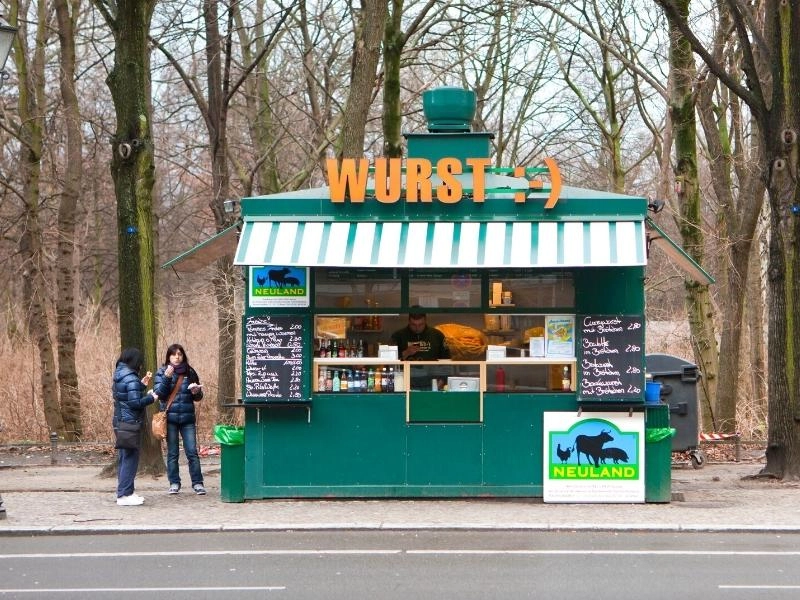
Are you looking for more motorhome touring guides? Check out these top posts…
The 21 Best Motorhome Routes in the UK for an Amazing Adventure!
Touring Europe in a Motorhome: The Best & Only Guide You Need!
Campervanning New Zealand: Literally Everything You Need to Know!
Campervanning & Motorhoming in Norway: Top Tips, Routes & Destinations
Campervanning & Motorhoming in Portugal: Your Complete Guide
Motorhoming in Italy: Your Complete Guide
Love it? Pin it!
